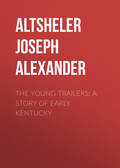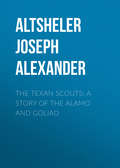
Altsheler Joseph Alexander
The Rulers of the Lakes: A Story of George and Champlain
But the triumphant sweep of the Northern allies was suddenly met by a deadly fire from Mohawks, rangers and Colonials. Daganoweda and his men, tomahawk in hand, leaped upon the van of the French Indians and drove them back. The rangers and the frontiersmen, sheltering themselves behind logs and tree trunks, picked off the French regulars and the Canadians as they advanced. A bullet from the deadly barrel of Black Rifle slew Legardeur de St. Pierre, who led Dieskau's Indians, and whom they always trusted. The savage mass, wholly triumphant a minute ago, gave back, and the panic among the Mohawks and Colonials was stopped.
When St. Pierre fell Robert saw a gallant figure appear in his place, a figure taller and younger, none other than St. Luc himself, the Chevalier, arriving in time to help his own, just as Daganoweda, Willet and the others had come in time to aid theirs. The Chevalier was unhurt, and while one dauntless leader had fallen, another as brave and perhaps more skillful had taken his place. Robert saw him raise a whistle to his lips, and at its clear, piercing call, heard clearly above the crash of the battle, the Indians, turning, attacked anew and with yet greater impetuosity.
The smoke from so much firing was growing very thick, but through it the regulars of the regiments, Languedoc and La Reine, in their white uniforms, could be seen advancing, with the dark mass of the Canadians on one flank and the naked and painted Indians on the other, confident now that their check had been but momentary, and that the victory would yet be utter and complete.
Nevertheless, the Colonials and the Mohawks had rallied, order was restored, and while they were giving ground they were retreating in good formation, and with the rapid fire of their rifles were making the foe pay dearly for his advance.
Grosvenor had snatched up a rifle and ammunition from a fallen man, and was pulling trigger as fast as he could reload. His face was covered with smoke, perspiration and the stains of burned gunpowder, the whole forming a kind of brown mask, through which his eyes, nevertheless, gleamed with a dauntless light.
"It won't be Duquesne over again! It won't be! It won't be!" he repeated to all the world.
"But if you're not more careful you'll never know anything about it!" exclaimed Robert, as he grasped him suddenly by the coat and pulled him down behind a log, a half dozen musket balls whistling the next moment where his body had been. Grosvenor, in the moment of turmoil and excitement, did not forget to be grateful.
"Thanks, my dear fellow," he said to Robert. "I'll do as much for you some time."
Robert was about to reply, but a joyous shout from the rear stopped him. Over a hill behind them a strong body of provincials appeared coming to help. Waraiyageh in his camp had received news of ambush and battle, and knowing that his men must be in desperate case had hurried forward relief. Never was a force more welcome. Along the retreating line ran a welcoming shout, and all facing about as if by a single order, they gave the pursuing French and Indians a tremendous volley.
Robert saw regulars, Canadians and Indians drop as if smitten by a thunderbolt, and the whole pursuing army, reeling back, stopped. Then he heard the French trumpets again, and waiting behind the log, he saw that the hostile array was no longer advancing. The trumpets of Dieskau were sounding the recall, for the time, at least. Robert did not know until afterward that the Indian allies of the French had suffered so much that they were wavering, and not even the eloquence and example of St. Luc could persuade them, for the time being, to continue such a dangerous pursuit.
A few minutes of precious rest were allowed to the harried vanguard of Johnson, and now, holding their fire for a time when it would be needed more, the men continued to fall back toward the main camp, from which they had so recently come. The crash of rifles and muskets sank, but both sides were merely preparing for a new battle. Robert examined himself carefully, but found no trace of a wound.
"How is it with you, Tayoga?" he asked.
"Tododaho and Areskoui have protected me once more," replied the Onondaga. "The exertion has made my shoulder stiff and sore a little, but I have taken no fresh hurt."
"And you, Grosvenor?"
"My head is thumping at a terrible rate, but I feel that it will soon become quieter."
"Its ability to thump shows that you're full of life. How about your men, Captain Colden?"
"Four of my brave lads are sped. God rest their souls! They died in a good cause. Some of the others are wounded, but we won't count wounds now."
Robert was still able to see the indistinct figures of the French and Indians, through the clouds of smoke that hung between the two armies, but he saw also that they were not pursuing. At the distance he heard no sounds from them, and he presumed they were gathering up their dead and wounded, preparing for the new attack that would surely come.
"I was not in the first battle, but I will be in the second," a youthful voice said beside him, and he saw the Mohawk boy, Joseph Brant, his face glowing.
"We heard the firing," continued the boy, "and Colonel Johnson hurried forward a force, as you know. We are almost back at the camp now."
Robert had taken no notice of distance, but facing about, he saw the main camp not far away. Lucky it was for them that Waraiyageh and his officers were men of experience. They had sent enough men to help the vanguard break from the trap, but they had retained the majority, and had made them fortify with prodigious energy. A barricade of wagons, inverted boats, and trees hastily cut down had been built across the front. Three cannon were planted in the center, where it was expected the main Indian and French force would appear, and another was dragged to the crest of a hill to rake their flank.
The retreating force uttered a tremendous shout as they saw how their comrades had prepared for them, and then, in good order, sought the shelter of the barricade, where they were welcomed by those who had not yet been in battle.
"Get fresh breath while you may!" exclaimed Tayoga, as he threw himself down on the ground. "The delay will not be long. Sharp Sword will drive the warriors forward, and the regulars and Canadians will charge. It will be a great battle, and a desperate one, nor does Tododaho yet whisper to me which side will win."
Robert and his comrades breathed heavily for a while, until they felt new strength pouring back into their veins. Then they rose, looked to their arms and took their place in the line of battle. The trumpets of Dieskau were sounding again in the forest in front of them, and the new attack was at hand.
"Keep close, Grosvenor," said Robert. "They'll fire the first volley and we'll let it pass over our heads."
"I know the wisdom of what you say," replied the Englishman, "but it's hard to refrain from looking when you know a French army and a mass of howling savages are about to rush down upon you."
"But one must, if he intends to live and fight."
Clear and full sang the trumpets of Dieskau once more. Despite his advice to Grosvenor, Robert peeped over the log and saw the enemy gathering in the forest. The French regulars were in front, behind them the Canadians, and on the flanks hovered great masses of savages. Smoke floated over trees and bushes, and the forest was full of acrid odors. Far to the right he caught another glimpse of St. Luc in his splendid white and silver uniform, marshaling the Indians, a shining mark, but apparently untouched.
"The attack will be fierce," whispered Tayoga, who lay on his left. "They consider their check a matter of but a moment, and they think to sweep over us."
"But we have hundreds and hundreds of good rifles that say them nay. Is Tododaho still silent, Tayoga?"
The Onondaga looked up at the heavens, where the deep blue, beyond the smoke, was unstained. There was the corner, where the star, on which his patron saint lived, came out at night, but no light shone from the silky void and no whisper reached his ear. So he said in reply:
"The great Onondaga chieftain who went away four hundred years ago is silent today, and we must await the event."
"We won't have to wait long, because I hear a single trumpet now, and to me it sounds wonderfully like the call to charge."
The silver note thrilled through the woods, the French regulars and Canadians uttered a shout, which was followed instantly by the terrible yell of the Indians, and then the thickets crashed beneath the tread of the attacking army.
"Here they come!" shouted Grosvenor, and, laying his rifle across the log, he fired almost at random into the charging mass. Robert and Tayoga picked their targets, and their bullets sped true. All along the American line ran the fierce fire, the crest of the whole barricade blazing with red, while the artillery, which the savages always dreaded, opened on them with showers of grape.
The Indians, despite all the bravery and example of St. Luc, wavered, and, as their dead fell around them, they began to give forth laments, instead of triumphant yells. But the regulars in the center, led by Dieskau, came on as steadily as ever, and the little group behind the log, of which Tayoga and Robert were the leading spirits, turned their rifles upon them. Robert presently heard a youthful shout of exultation at the far end of the log, and he saw the boy, Joseph Brant, reloading the rifle which he had fired in his first battle. The French regulars suddenly stopped, and Grosvenor cried:
"It will be no Duquesne! No Duquesne again!"
The French were not withdrawing. Upon that field, as well as every other in North America, they showed that they were the bravest of the brave. Wheeling his regulars and Canadians to the right, Dieskau sought to crush there the three American regiments of Titcomb, Ruggles and Williams, and for an hour the battle at that point swayed to and fro, often almost hand to hand. Titcomb was slain and many of his officers fell, but when Dieskau himself came into view an American rifleman shot him through the leg. His adjutant, a gallant young officer named Montreuil, although wounded himself, rushed from cover, seized his wounded chief in his arms and bore him to the shelter of a tree.
But he was not safe long even there. While they were washing his wounds he was struck again by two bullets, in the knee and in the thigh. Two Canadians attempted to carry him to the rear. One was killed instantly, and Montreuil took his place, but Dieskau made them put him down and directed the adjutant to lead the French again in a desperate charge to regain a day that had started so brilliantly, and that now seemed to be wavering in the balance.
Colonel Johnson himself had been wounded severely, and had been compelled to retire to his tent, but the American colonels, at least those who survived, conducted the battle with skill and valor. The cannon, protected by the riflemen, still sent showers of grape shot among the French and Indians. The huge Tandakora with St. Luc tried to lead the savages anew upon the American lines, but the hearts of the red men failed them.
The French regulars, urged on by Montreuil, charged once more, and once more were driven back, and the Americans, rising from their logs and coverts, rushed forward in their turn. The regulars and Canadians were driven back in a rout, and Dieskau himself lying among the bushes was taken, being carried to the tent of Johnson, where the two wounded commanders, captor and captive, talked politely of many things.
The victory became more complete than the Americans had hoped. The Indians who had stayed far in the rear to scalp those fallen in the morning were attacked suddenly by a band of frontiersmen, coming to join Johnson's army, and, although they fought desperately and were superior in numbers, they were routed as Dieskau had been, the survivors fleeing into the forest.
Thus, late in the afternoon, closed the momentous battle of Lake George. The French and Indian power had received a terrible blow, the whole course of the war, which before had been only a triumphant march for the enemy, was changed, and men took heart anew as the news spread through all the British colonies.
When Dieskau's regulars, the Canadians and the Indians, broke in the great defeat, Robert, Tayoga, Willet, Grosvenor, the Philadelphia troop, Black Rifle and Daganoweda, all fierce with exultation, followed in pursuit. But the enemy melted away before them, and then, from the crest of a hill, Robert heard the distant note of a French song he knew:
Hier, sur le pont d'Avignon
J'ai oui chanter la belle
Lon, la,
J'ai oui chanter la belle,
Elle chantait d'un ton si doux
Comme une demoiselle
Lon, la,
Comme une demoiselle.
"At least he has escaped," said Robert.
"The bullet that kills him is not molded and never will be," said Tayoga.
"How do you know?" asked Willet, startled.
"Because Tododaho has whispered it to me. I heard his voice in the breath of the wind as we pursued through the forest."
Robert caught a glimpse of St. Luc, in his uniform of white and silver, still apparently unstained, erect and defiant. Then he disappeared and they heard only the singing of the wind among the leaves.







